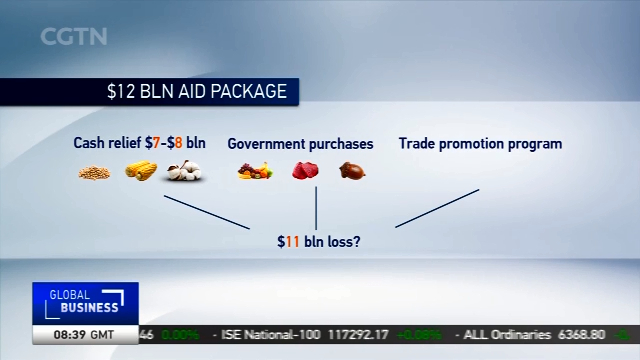
18:25, 30-Jul-2018
China-US Trade tensions: Perdue: Aid won't make up for farm losses
Updated
18:13, 02-Aug-2018
02:52

The U.S. government is planning for a 12-billion-US dollar aid package for farmers by October in response to retaliatory measures on American farm exports. But Agriculture Secretary Sonny Perdue warned over the weekend that the aid plan won't make up for all the losses.
The plan would include direct cash relief of 7 to 8 billion US dollars for farmers who raise soybeans, sorghum, corn, wheat, cotton, dairy and hogs. The plan also offers government purchases in such sectors as fruits, nuts and pork. It also promises a trade promotion program to develop new markets. However, American farmers are still expected to take an 11-billion-dollar hit due to retaliatory tariffs.
SONNY PERDUE US AGRICULTURE SECRETARY "This is a temporary measure. Really a time to give President Trump and his negotiating team to get these trade disputes resolved. I think it's for the 2018 crop. Well obviously this is not going to make farmers whole. And when soybean farmers say they've lost two dollars in market value from March - although it's coming back some - then this is not a two dollar program."
That sentiment has been echoed by many American food producers, who would rather bargain themselves in a global market than get government subsidies. They say that's because farmers rely so much on exports to big markets like China. For example, the U.S. is the world's largest soybean producer with 60 percent of its exports going to China every year. The soybeans are a hard sell these days now that China has triggered a 25-percent retaliatory tariff.
Delong is a 90-year-old Wisconsin-based food distributor and major soybean dealer. The company's annual trade volume with China has annually topped 100 million US dollars in recent years. But now the business has been stalled by tariffs, and it's struggling to find substitute markets. The company has lowered purchasing prices by 20 percent for soybeans in accord with the selling prices.
Xia Cheng, CGTN.

SITEMAP
Copyright © 2018 CGTN. Beijing ICP prepared NO.16065310-3
Copyright © 2018 CGTN. Beijing ICP prepared NO.16065310-3